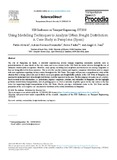Mostrar el registro sencillo del ítem
Using modelling techniques to analyze urban freight distribution. A case study in Pamplona (Spain)
| dc.creator | Álvarez, Pablo | es_ES |
| dc.creator | Serrano Hernández, Adrián | es_ES |
| dc.creator | Faulín Fajardo, Javier | es_ES |
| dc.creator | Juan Pérez, Ángel Alejandro | es_ES |
| dc.date.accessioned | 2019-08-14T11:21:29Z | |
| dc.date.available | 2019-08-14T11:21:29Z | |
| dc.date.issued | 2018 | |
| dc.identifier.issn | 2352-1457 | |
| dc.identifier.uri | https://hdl.handle.net/2454/34344 | |
| dc.description | Trabajo presentado a la 13th Conference on Transport Engineering, CIT 2018. Gijón, 6-8 de junio de 2018. | es_ES |
| dc.description.abstract | The city of Pamplona, in Spain, is currently experiencing several changes regarding sustainable mobility such as pedestrianization of some streets in the city center, and access control to the Old Town for motor vehicles through the use of automatic number-plate recognition. However, some groups including local neighbors and businesses are raising complaints as they are being affected by these measures. This is also the case for couriers and logistics companies which have now to comply with new regulations regarding delivery routes throughout the Old Town. This paper will present a comprehensive study of the situation that is being carried out, and in which social perceptions and freight traffic patterns in the Old Town of Pamplona are analyzed to understand how urban freight distribution could be improved in the area. For this purpose, we make use of a survey-based research to the stakeholders, i.e. pedestrians, logistics companies, retailers, and authorities of Pamplona. Results highlight pollution derived from transportation, lack of parking spaces as well as invasion of public spaces in the city center as the key issues for improving freight transportation in the Old Town. Finally, placing a distribution center in the Old Town and the promotion of the cycle-logistics are considered as the future of the urban distribution in Pamplona. | en |
| dc.description.sponsorship | This work has been partially supported by the Spanish Ministry of Economy and Competitiveness (TRA2013-48180-C3-P and TRA2015-71883-REDT), FEDER, and the Ibero-American Program for Science and Technology for Development (CYTED2014-515RT0489). Moreover, we appreciate the financial support of the Erasmus+ Program (2016-1-ES01-KA108-023465) and the CAN Foundation in Navarre, Spain (Grant CAN2017-6101). Likewise, we want to acknowledge the financial support received by Spanish Ministry of Education (Grant FPU 2014-0024). | en |
| dc.format.extent | 8 p. | |
| dc.format.mimetype | application/pdf | en |
| dc.language.iso | eng | en |
| dc.publisher | Elsevier | en |
| dc.relation.ispartof | Transportation Research Procedia, 33, 37-74 | en |
| dc.rights | © 2018 The Authors. This is an open access article under the CC BY-NC-ND license. | en |
| dc.rights.uri | http://creativecommons.org/licenses/by-nc-nd/4.0/ | |
| dc.subject | City logistics | en |
| dc.subject | Freight distribution | en |
| dc.subject | Mobility | en |
| dc.subject | Sustainability | en |
| dc.title | Using modelling techniques to analyze urban freight distribution. A case study in Pamplona (Spain) | en |
| dc.type | info:eu-repo/semantics/conferenceObject | en |
| dc.type | Contribución a congreso / Biltzarrerako ekarpena | es |
| dc.contributor.department | Institute of Smart Cities - ISC | es_ES |
| dc.rights.accessRights | info:eu-repo/semantics/openAccess | en |
| dc.rights.accessRights | Acceso abierto / Sarbide irekia | es |
| dc.identifier.doi | 10.1016/j.trpro.2018.10.077 | |
| dc.relation.projectID | info:eu-repo/grantAgreement/MINECO//TRA2013-48180-C3-1-P/ES/ | en |
| dc.relation.projectID | info:eu-repo/grantAgreement/MINECO//TRA2015-71883-REDT/ES/ | en |
| dc.relation.publisherversion | https://doi.org/10.1016/j.trpro.2018.10.077 | |
| dc.type.version | info:eu-repo/semantics/publishedVersion | en |
| dc.type.version | Versión publicada / Argitaratu den bertsioa | es |



